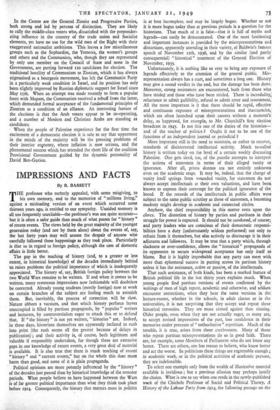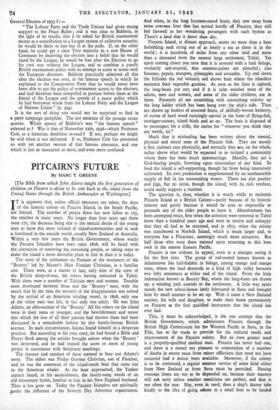IMPRESSIONS AND FACTS
By R. BASSETT
THE professor who recently appealed, with some misgiving, to his own memory, and to the memories of "millions living," against a misleading version of an event which occurred some thirteen years ago, is entitled to our sympathy. Unaided memory is all too frequently unreliable—the professor's was not quite accurate— but it is often a safer guide than much of what passes for " history " of recent events. The views held by the great majority of the younger generation today (and not by them alone) about the events of, say, the last forty years may well arouse the despair of anyone who carefully followed those happenings as they took place. Particularly is that so in regard to foreign policy, although the case of domestic affairs is little better.
The gap in the teaching of history (and, to a greater or less extent, in historical knowledge) of the decades immediately behind us raises problems the political importance of which is inadequately appreciated. The history of, say, British foreign policy between the two World Wars remains to be written. If and when it comes to be written, many erroneous impressions now fashionable will doubtless be corrected. Already young students (mostly foreign) now at work on certain branches of the subject are finding much to astonish them. But, inevitably, the process of correction will be slow. Nature abhors a vacuum, and that which history perforce leaves unoccupied is filled by partisan propaganda, by " popular " writers and lecturers, by controversialists eager to attack this or to defend that. If " the history " is not yet written, " histories " are. Indeed, in these days, historians themselves are apparently inclined to rush into print (the rush seems all the greater because of delays in publication); and their activity is, of course, both legitimate and valuable if responsibly undertaken, for though there are extensive gaps in our knowledge of recent events, a very great deal of material is available. It is also true that there is much teaching of -recent " history " and " current events," but on the whole this does more harm than good, and some of it is plain propaganda.
Political opinions are more potently influenced by the " history " of the decades just passed than by historical knowledge of the remoter periods. What people believe to have happened between the Wars is of far greater political importance than what they think took place before 1914. Consequently, the history that matters most in politics is at best incomplete, and may be largely bogus. Whether or not it is more bogus today than at previous periods is a question for the historians. That much of it is false—that it is full of myths and legends—can easily be demonstrated. One of the most fascinating and important instances is provided by the misrepresentations and distortions, apparently unending in their variety, of Baldwin's famous speech of November 12th, 1936, and by the similar (and partly consequential) " historical " treatment of the General Election of November, 1935.
Unfortunately, it is nothing like so easy to bring any exposure of legends effectively to the attention of the general public. Mis- representation always has a start, and sometimes a long one. History may give a sound verdict in the end, but the damage has been done. Moreover, strong resistances are encountered, both from those who have misled and those who have been misled. There is incredulity,' reluctance to admit gullibility, refusal to admit error and resentment. All the more important is it that there should be rapid, effective and continuous exposure of misrepresentations and inaccuracies; which are often launched upon their careers without a moment's' delay, as happened, for example, to Mr. Churchill's first election, broadcast in 1945. Is not this one of the duties of the historian— and of the teacher of politics ? Ought it not to be one of the functions of an independent journal or periodical ?
More important still is the need to maintain, or rather to recover, standards of disinterested intellectual activity. Much so-called history is written today on the level of a certain weekly discussing Palestine. One gets tired, too, of the puerile attempts to interpret the actions of statesmen in terms of their alleged vanity or ignorance. After all, prima donnas are not entirely unknown even on the academic stage. It may be, indeed, that the charge of, vanity itself springs from wounded vanity, for statesmen do not always accept intellectuals at their own valuations, and have been known to express their contempt for the political ignorance of the breed. If the records of the intellectuals in public affairs were subject to the same public scrutiny as those of statesmen, a becoming modesty might develop in academic and connected circles.
Anyhow, the chief responsibility in this matter rests upon the clercs. The distortion of history by parties and partisans in their struggle for power is expected. It should not be condoned, of course;. and party leaders who are conscious of their democratic responsi- bilities have a duty (unfortunately seldom performed) not only to refrain from it themselves, but also actively to discourage it in their adjutants and followers. It may be true that a party which, through slackness or over-confidence, allows the " historical" propaganda of its opponents to secure widespread acceptance has only itself to blame. But it is highly improbable that any party can meet with more than ephemeral success in putting across its partisan history unless it has the assistance, active or passive, of the intellectuals.
That such assistance, of both kinds, has been a marked feature of British political life in the last thirty years explains much. When young people find partisan versions of events confirmed by the writings of men of high repute, academic and otherwise, and seldom encounter corrections, when they hear the same versions in the lecture-rooms, whether in the schools, in adult classes or in the universities, it is not surprising that they accept and repeat these historical travesties. They are more sinned against than sinning. Older people, even when they are not actually- eager, as many are, to accept revised impressions of the past, lose confidence in their memories under pressure of " authoritative " repetition. Much of the trouble, it is true, arises from sheer carelessness. Many of those who repeat partisan misrepresentations do so in good faith. There are, for example, some Members of Parliament who do not know any better. There are others, one has reason to believe, who know better and act the worse. In politicians these things are regrettable enough ; in academic work, or in the political activities of academic persons, they are indefensible.
To select one example only from the wealth of illustrative material available is invidious ; but a previous allusion may perhaps justify the choice. What is one to say when one reads in the newly-published work of the Chichele Professor of Social and Political Theory, A History of the Labour Party from 1914, the following passage on the General Election of 1935 ? -
" The Labour Party and the Trade Unions had given strong support to the Peace Ballot ; and it was clear to.Baldwin, in the light of its results, that if he asked for British rearmament except as a contribution to a League system of collective security, he would be likely to fare but ill at the polls. If, on the other hand, he could get a clear Tory majority in a new House of Commons by deceiving the electors into a belief that he would stand by the League, he would be free after the Election to go his own way without the League, and to combine a purely British rearmament policy with an attempt to come to terms with the European dictators. Baldwin practically admitted all this after the election was over, in the famous speech in which he explained to the Conservative Party that he would never have been able to put his policy of rearmament across to the electors, and had therefore been compelled to posture before them as the friend of the League and the apostle of a peace policy which he had borrowed whole from the Labour Party and the League of Nations Union" (p. 304).
It is the sort of thing one would not be surprised to find in a party campaign pamphlet. The last sentence of the passage raises queries. Which speech of Baldwin's was " the famous speech " referred to ? Was it that of November 12th, 1936—Which Professor Cole, as a historian, doubtless re-read ? If not, perhaps we might be told when it was delivered. If so, Professor Cole has presented us with yet another version of that famous utterance, and one which is just as inaccurate as most, and even more confused.







































 Previous page
Previous page